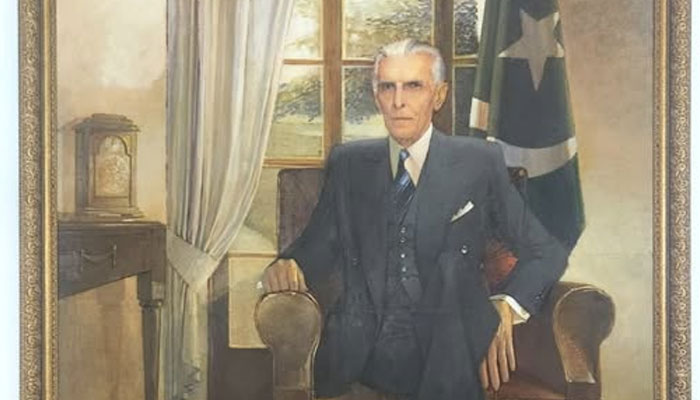‘Younger generation should understand why Pakistan was created, what it aimed to achieve’
The Board of Management at the Quaid-e-Azam House Museum held an event titled ‘Pakistan in 1947 and Pakistan Today’ at the Quaid-e-Azam House Museum on Thursday.
The senior vice chairman of the Board of Management, Liaquat Merchant, welcomed the speakers, including the spokesperson for the Ministry of Foreign Affairs and ambassador-designate to France, Ameena Saiyid, and Prof Muhammad Ali Sheikh.
Merchant highlighted the Quaid-e-Azam House Museum’s commitment to promoting the Quaid’s legacy and fostering nation-building efforts. He urged the younger generation to understand why Pakistan was created and what it aimed to achieve.
Speaking about the event’s theme, he explained that Jinnah’s words inspired and strengthened the Muslims of the subcontinent in 1947.
Jinnah described Pakistan as a moral and intellectual achievement, envisioned as a democratic state rooted in Islamic principles without being a theocracy.
He emphasised that Pakistan would ensure equal rights and privileges for all citizens, including Hindus, Christians, and Parsis, enabling everyone to contribute to the nation’s progress.
Merchant described how Pakistan came into being through the power of speech, the power of the pen, and the power of the vote — tools that proved mightier than the sword. He highlighted Jinnah’s peaceful and intellectual approach to the struggle for Pakistan. Jinnah avoided street protests and sit-ins and never faced imprisonment because he always acted within the boundaries of the law.
Encouraging Pakistan’s youth to explore Jinnah’s vision, Merchant recommended students read the book ‘Quotes from the Quaid’. He cited Professor Stanley Wolpert, author of ‘Jinnah of Pakistan’, who said: “Every Pakistani, from your youngest child to your oldest scholar, should read this wonderful book, Quotes from the Quaid, with pride and joy.”
He also emphasised Jinnah’s dedication to education. Jinnah established the Dawn Trust to educate Indian Muslims, develop public opinion, and spread knowledge. He also prioritised protecting Pakistan’s minorities by ensuring they received equal treatment and full protection under the law.
Commenting on Pakistan today, he said the country’s renewed focus on honouring Jinnah’s legacy of diversity. Leaders from the federal and provincial governments, along with senior military officials, have engaged with Christian communities and extended similar efforts to Hindu citizens. These actions underscore Pakistan’s commitment to treating all citizens equally and ensuring equal legal protection.
Reflecting on Pakistan’s journey, he acknowledged the country's challenges, including martial laws, constitutional suspensions, political unrest, and the imprisonment of leaders. Despite these difficulties, he expressed hope that Pakistan will become a peaceful state—at peace within and with its neighbours. He envisioned a future where the nation progresses with unity, faith, and discipline, achieving prosperity for all.
-
 Breezy Johnson Engaged At Olympics After Emotional Finish Line Proposal
Breezy Johnson Engaged At Olympics After Emotional Finish Line Proposal -
 King Charles Wants Andrew To 'draw A Line' Under Epstein Issue
King Charles Wants Andrew To 'draw A Line' Under Epstein Issue -
 John Wick Game Confirmed With Keanu Reeves And Lionsgate Collaboration
John Wick Game Confirmed With Keanu Reeves And Lionsgate Collaboration -
 Gigi Hadid Feels 'humiliated' After Zayn Malik's 'pathetic' Comment: Source
Gigi Hadid Feels 'humiliated' After Zayn Malik's 'pathetic' Comment: Source -
 Olympics Men Hockey Game: McDavid, Crosby Power Canada Past Czechia
Olympics Men Hockey Game: McDavid, Crosby Power Canada Past Czechia -
 Sony PlayStation State Of Play Reveals 'Castlevania' And 'Metal Gear' Return
Sony PlayStation State Of Play Reveals 'Castlevania' And 'Metal Gear' Return -
 Ontario Tuition Freeze Ends, Allowing Colleges And Universities To Raise Fees
Ontario Tuition Freeze Ends, Allowing Colleges And Universities To Raise Fees -
 King Charles Should Apologise To All Rape Victims, Says New Poll
King Charles Should Apologise To All Rape Victims, Says New Poll -
 Cardi B Shares Emotional Message Amid Stefon Diggs Split Rumors
Cardi B Shares Emotional Message Amid Stefon Diggs Split Rumors -
 James Van Der Beek’s 'heartbroken' Ex Wife Breaks Silence Of His Death
James Van Der Beek’s 'heartbroken' Ex Wife Breaks Silence Of His Death -
 Sarah Ferguson, Shamed Andrew Spotted In ‘family Costume Drama’
Sarah Ferguson, Shamed Andrew Spotted In ‘family Costume Drama’ -
 Kylie Kelce Reveals Why She Barely Planned Her Wedding Day?
Kylie Kelce Reveals Why She Barely Planned Her Wedding Day? -
 Why Shamed Andrew Called His Victims ‘Mrs Windsor’
Why Shamed Andrew Called His Victims ‘Mrs Windsor’ -
 Kate Hudson Explains Why Acting Isn't Discussed At Home
Kate Hudson Explains Why Acting Isn't Discussed At Home -
 Prince William, Kate Middleton Epstein Statement Was AI Generated, Says Expert
Prince William, Kate Middleton Epstein Statement Was AI Generated, Says Expert -
 Sarah Ferguson On Her Way To Hurt 'only Two People Who Care About Her'
Sarah Ferguson On Her Way To Hurt 'only Two People Who Care About Her'




